How we traded games from newspaper kiosks

A couple of months ago, we bought three press kiosks in Mosigra. More precisely, as - received in the long-term lease. Actually, we wanted to get into the market and play, but in reality, it seems, it’s just a story of one of the great opportunities that we don’t want to do and in which we bury a million rubles and calm down.
What surprises me much more is that we learned how many people buy newspapers. This is just a plague! The twenty-first century is in the yard, space ships travel through the Universe, Facebook, 15 likes, knows what I like and what doesn't - and people buy and read paper newspapers. With enviable constancy.
')
And - there is the wildest irrationality of the use of paper. Each cycle we take a kilogram of 10 old newspapers for recycling, and they bring a kilogram of 30 new ones. Now tell you what and how.
Ecosystem
The story began with the fact that these kiosks banned from selling cigarettes. Not in the sense, in the stalls "Press", but in the sense - in general in the halls up to 50 square meters. This is an anti-tobacco campaign of the Ministry of Health. Kommersant claims that tobacco is 15% of the turnover of such kiosks. We monitored the changes through the familiar owner of a small group of stalls - in fact, it turned out that tobacco accounted for 30-40% in terms of revenue without additional sales, but in terms of profit it’s actually 15-20% approximately, plus those who came for cigarettes, bought a newspaper or something anything else.
The revenue of one kiosk on average is 100-200 thousand rubles per month according to the Association of distributors of printed products (data for the summer of 2017). The market is 2 billion rubles for 2016. Practice: there are bad kiosks with revenues up to a hundred, and good at 300+. We have only one makes 300, another full slag, and one dangles about 100-120.
The salary of the seller, judging by the vacancies on the sites for work - 17-25 thousand rubles. Rent from 9 thousand rubles, but we took over 35 thousand rubles (set by the competition, we won three kiosks with exactly such parameters of the financial model).
Kiosks belong to the city, you get them for rent, but you can not do anything - no modifications, no outdoor advertising, no external branding. Above - the inscription "Press", everything else - strictly behind the glass. The kiosk walls are sometimes used as billboards for social advertising or city news.
Finmodel
- Rent: 35 thousand rubles per month
- Seller's salary: 1500 rubles per shift + taxes (coefficient 1.49). In the change of one person, they all need two per point (to work according to the schedule “two through two”), the mode of operation at our two kiosks in the center is from 8 am to 8 pm (in a residential area you need to open from 6:30 or 7: 00 before people take the subway).
- Extra charge on the press is 30%, according to the conditions it is necessary to have at least 60% of the display of printed products. Extra charge from 30 to 100% on other goods, for example, water.
- There are almost no capital expenditures: everything gives the city "turnkey" in a perfect finish. Inside the kiosk there is an air conditioner, an internal fridge for drinks, electricity supply. The stall is really very cool - a spacecraft in miniature. Electricity bill and other regular payments about 3 thousand rubles per month. Security is not needed - robbing a stall for a maximum of 15 thousand rubles of revenue is somehow stupid, and robbing it for the sake of a product is doubly stupid - after all, it will have to be sold somewhere later, and in a day or two, until the newspapers become outdated.
The main question is what happens to the press, which is not for sale. There is an extravaganza here. So, there is a single distributor of all paper, taking it from publishers. More precisely - there are several large ones, but we are working with one. He gives the goods for sale - almost every morning he brings newspapers, takes away the old ones. How much is sold - our revenue. You can influence deliveries to a certain degree, but the guys work with good math, so auto-order is very convenient. In a situation where you are loaded under the real, and even on the priority of reloading on the shelf under the peaks, the optimization of the order will give very little. The only point is that there is a small part of the non-returnable goods, which must be looked at manually. And there is still a product with a permissible return rate (for example, 20%) - you should also be careful about it so that you don’t get into too much.
In many publications, the distributor’s obligations are very simple - to be in a shop window in a certain place or on a certain priority. There is - no matter, sold or not, we carry here and there. Where they go to bloody tear through the paper every time and how tight the price is from the publisher, I can’t even imagine. But having seen this, I already love tablets for environmental friendliness - even if you burn a small wood for the production of an aluminum case, you will still have less losses.
Why publishers need this is a separate question. I was led to certain thoughts by a story told by the editor of “Maxim” about how people enter the site. The logic is approximately the same - if you do not see it on sale in the metro, then it will not go to the site. That is, placement is rather advertising costs than the back part of the business.
Formats stalls now - box office, flowers, ice cream, the press. We put it on the press - the principle of their distribution changed there, and many players flew off the market.
Our bright idea
The first idea was simple: if most of the calculations are printed products, then wait, you can build a mono-brand network purely on the desk. Because they are also printed products. But no, nifiga like this - this bug someone covered in time with clarifications about periodicals.
The second thought - probably, you can sell board games, and this will compensate for the lack of smoking. If it turns out - each such kiosk brings 20-30 thousand rubles of profit per month, plus with about a hundred kiosks, you get an excellent network of self-deliveries.
The third thought is simply to check the finmodel and evaluate how you can replace the smoke. We rather played here, since the scales of the sums are small. It was damn interesting, and there was somewhere a five percent chance that it was a serious vein.
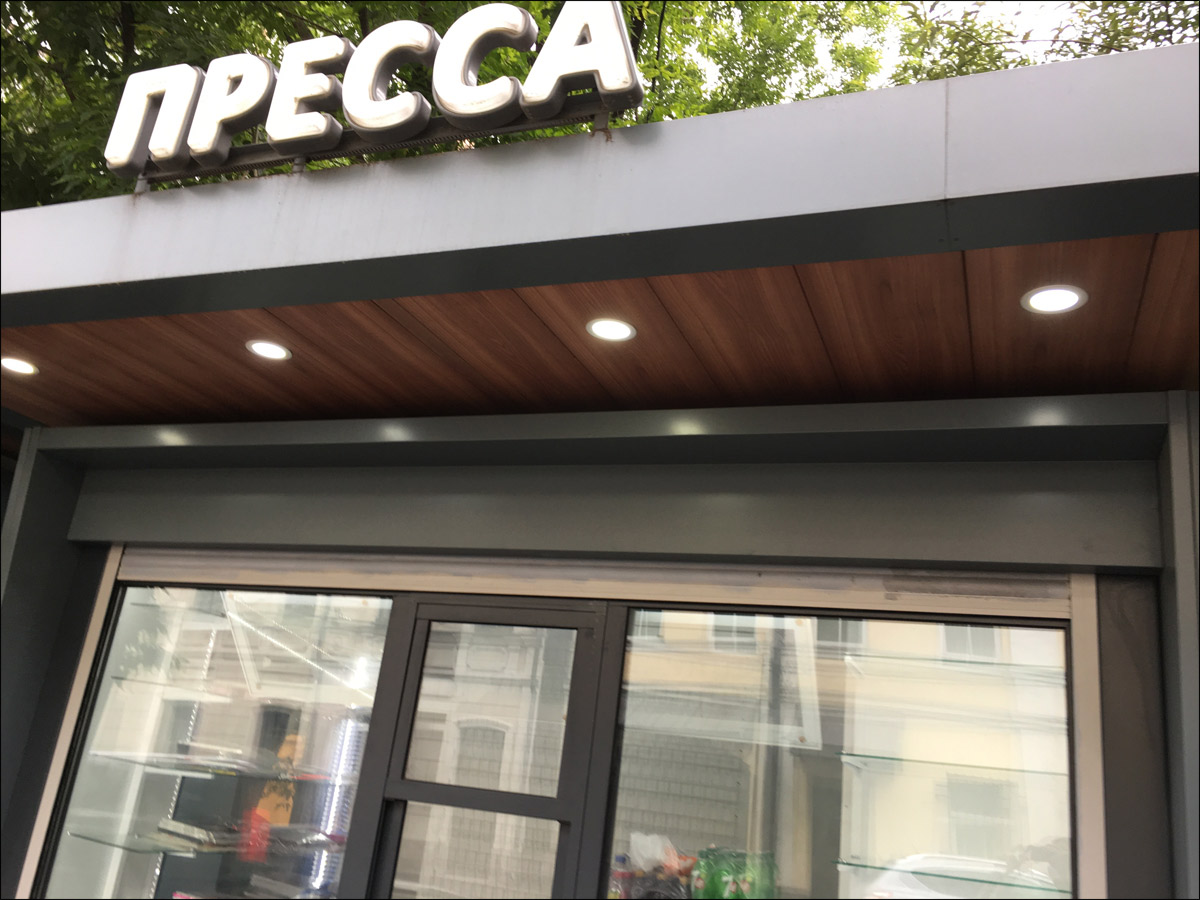
Kiosks
The newest kiosk on Belorusskaya, 400 meters from the metro, in a residential area. We decided to fill it with the standard press, plus fill it with what is known in the famous joke as “a wide range of different goods”. Cheap bright things that people need for some reason. Example - the same spinners, pens, stickers. In normal stores, we do not trade them (or we trade in goods of the same type, but a higher class, and few) - and here it was necessary to deliver experience. Practice has shown that someone survives.
The first kiosk - Victory Park at the metro. It is open in the middle of summer, we have run in several options for stuffing goods. There, the main buyers are tourists. At the same time, damn it, 50% of buyers are Chinese. The Chinese really need toilet paper, napkins, handkerchiefs, matches, small dolls. They have largely determined the range - everything that, behind the minimum of the press, has become their commodity. By the way, it is difficult to determine the proportion of periodicals in the calculation, there is no methodology - but, apparently, secret buyers go around Moscow, because it was at this kiosk that we received instructions to stop violating outrages. Therefore, the methodology is as follows: received a prescription - it means that it was less than necessary. Reduced the proportion of toilet paper.
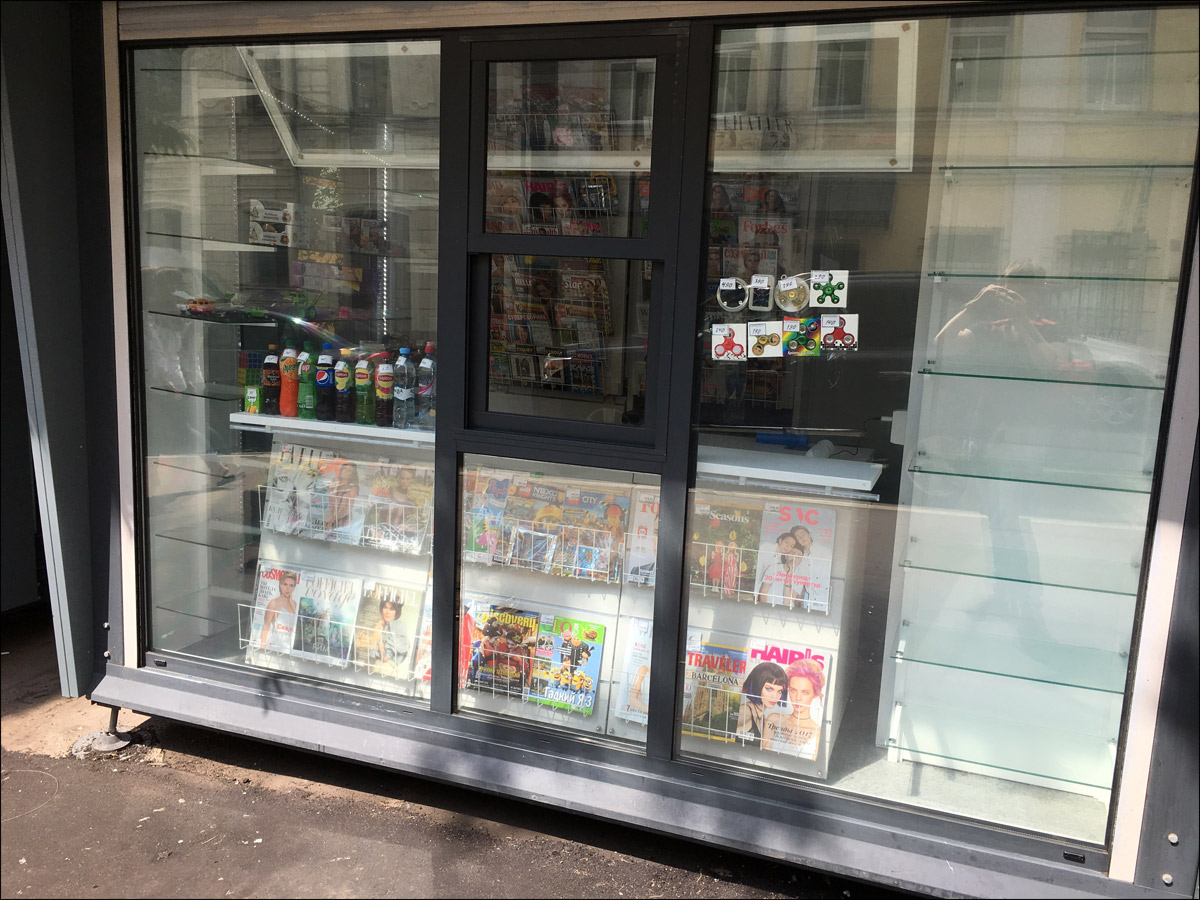
The first hour of work, not all the press has arrived.
The third kiosk on Tsvetnoy - right downtown, business environment. It concentrates the business press, while we are adjusting to the public. As I remember now, when I wanted to buy the last time RBC paper magazine, where they wrote about us, I was somewhat ohrenel from the retail price in contrast to the price of downloading PDF.
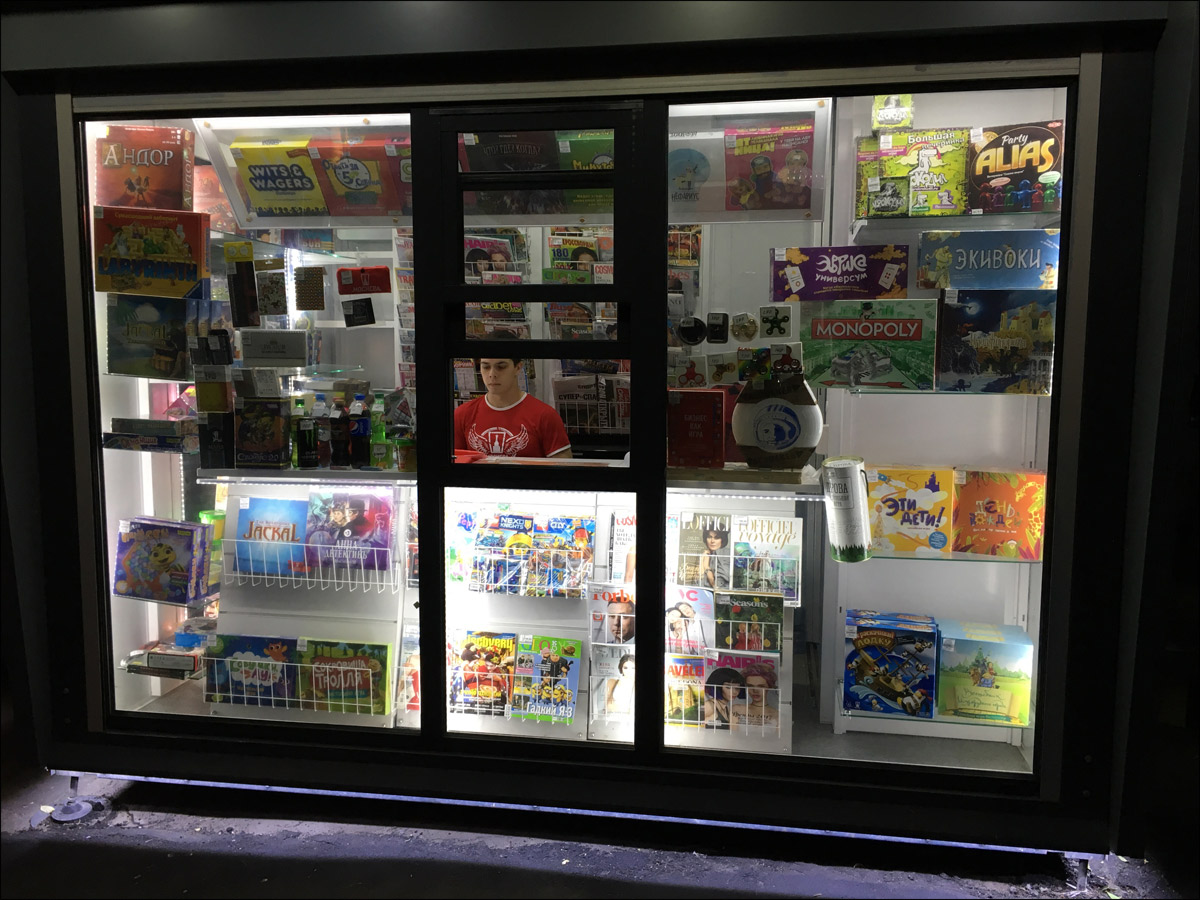
Before entering the contest, our specialist Artem himself worked at a friend’s kiosk. It was he who took the leadership of this project. There he figured out the economy, got the feeling that he could work. Past the first tender flew with a bang, because they indicated too low rates. The second time happened. Victory Park - the opening at the beginning of July, Tsvetnoy - in the middle of July, Belarus - here are a few weeks, almost now.
How were board games and stuff sold?
Obviously, until the end of the experiment, these kiosks could not be advertised and generally mentioned about them. The reason is simple - if we redistribute our flows to the kiosk, it will simply be weaning customers from other stores, and not making money from the kiosk. The task is to have the kiosk reach the operational payback itself (and there are no capital expenditures in the financial model, that is, there are no special investments except for the goods). If it comes out, there will already be a conversation.
At first, we were pleasantly surprised by the amount of press purchased. Every Wednesday a squall began: a television program was coming out. Sales doubled. On weekdays, people bought all sorts of gardener's messengers, healthy lifestyles, crossword puzzles - in general, everything that the distributor loaded was real. Yes, half of the publications in the status of "to lay", mostly magazines. But the rest was taken apart with wild speed. Sometimes at 7 am there were small queues of pensioners. Yes, by the way, younger than 40 years (by eye) - only newspapers with ads, the rest - the lot of the older generation.
In the summer, sales of water and cold drinks went very well. The goal is to get 15 thousand revenue per day from the kiosk with ridiculous average checks. She was almost able to achieve, that is, the operation went on a balance of about zero. As soon as the sun got cold and the sun went down - water sales were cut off, and we were again in minuses. Experienced guys say that the peak of sales is just winter, but we don’t really believe it - it looks like it was connected with smoke.
We tried the desktops of category A (the best-selling, that is, the hits) - more than 30 pieces in the window did not climb. The people watched, sluggishly bought (our record - 23 thousand per day), but did not burn with activity. That is, they will learn the games, but they cannot show and play (this is our fad), plus there is no habit of buying something big at these kiosks.
Kiosks in other countries
Now I will show how it works in other countries of the world. Here is China, a country of developed communism. They have this "stationery and the press", in fact:

Barcelona tourist takeaway:
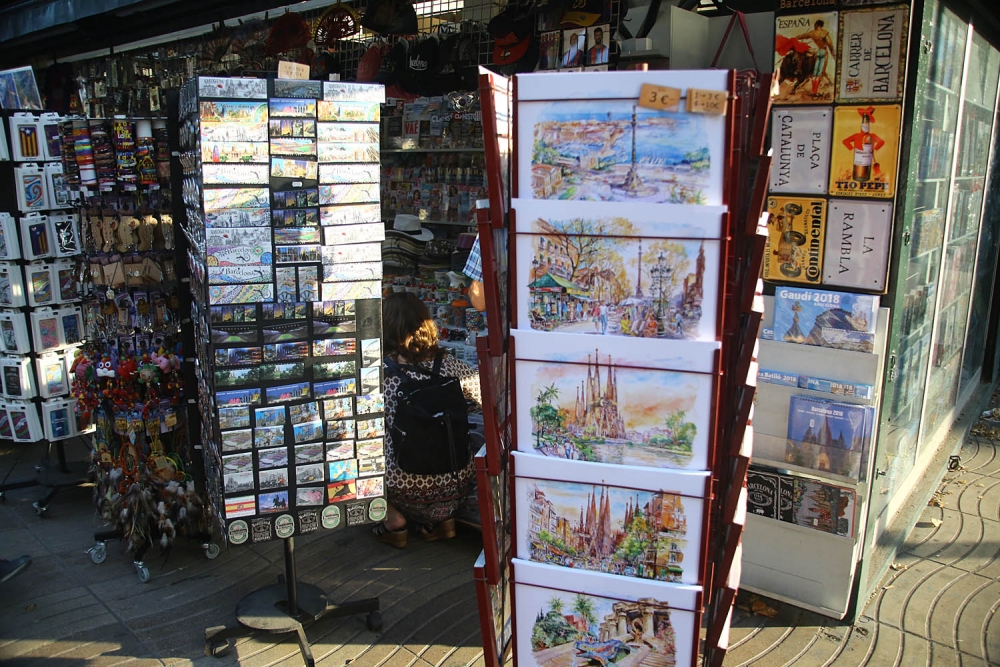
Scotland, press for sailors on the island:
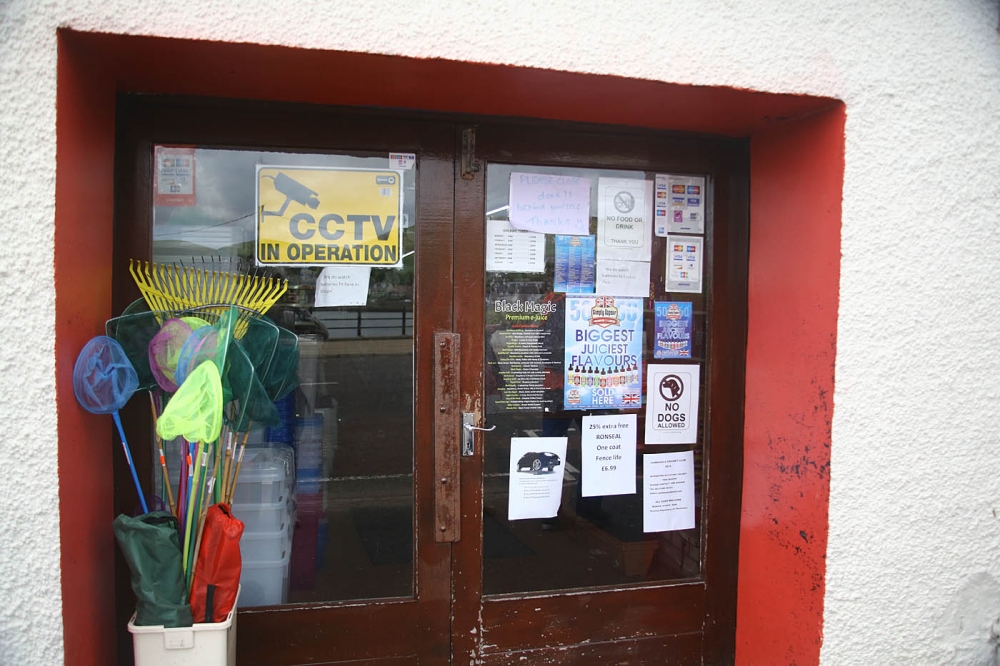
Berlin is very beautiful - but their tradition of paper will remain for a long time:
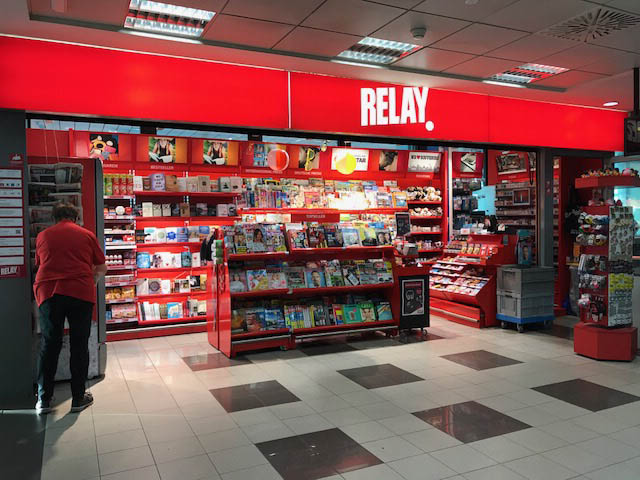
In St. Petersburg, one of the coolest kiosks in the world - First Band - right at the metro stations.
More kiosks are sometimes used as items where there are always first-aid kits - I saw this in China and Australia, but I don’t know if this is a local experience or a systemic phenomenon.
Resume in Moscow
The result - most likely, we look to the first snow. If we do not reach a stable operational payback, we close the project with a fixation of losses. There is a scenario of premature termination of a long-term lease agreement on our initiative without violations with payment of compensation. Expensive, but several years of permanent losses are more expensive. Another theory under verification is what will happen if Mosigra sellers trained under the desktops stand in stalls (now an ordinary seller cannot answer questions about games and does not open them). If this significantly changes the revenue, then it will also be possible to continue playing.
Another of the features noticed that more stalls - proportionally more sales. There are kiosks that generally do not work at all, for example, one such amazing stands on Proletarskaya. He seems to be at the exit of the metro, but he is so strangely placed between two paths that no one approaches him. Three meters to the side - and he is in the ladies. Who and how it was planned is a mystery.
The most fun, of course, is how pensioners, almost ready to buy a desktop, angrily returned it back to the window of the kiosk and grumbled:
- In Mosigre cheaper!
Prices, of course, were the same. But we did not dare to compete with ourselves.
Source: https://habr.com/ru/post/339302/
All Articles